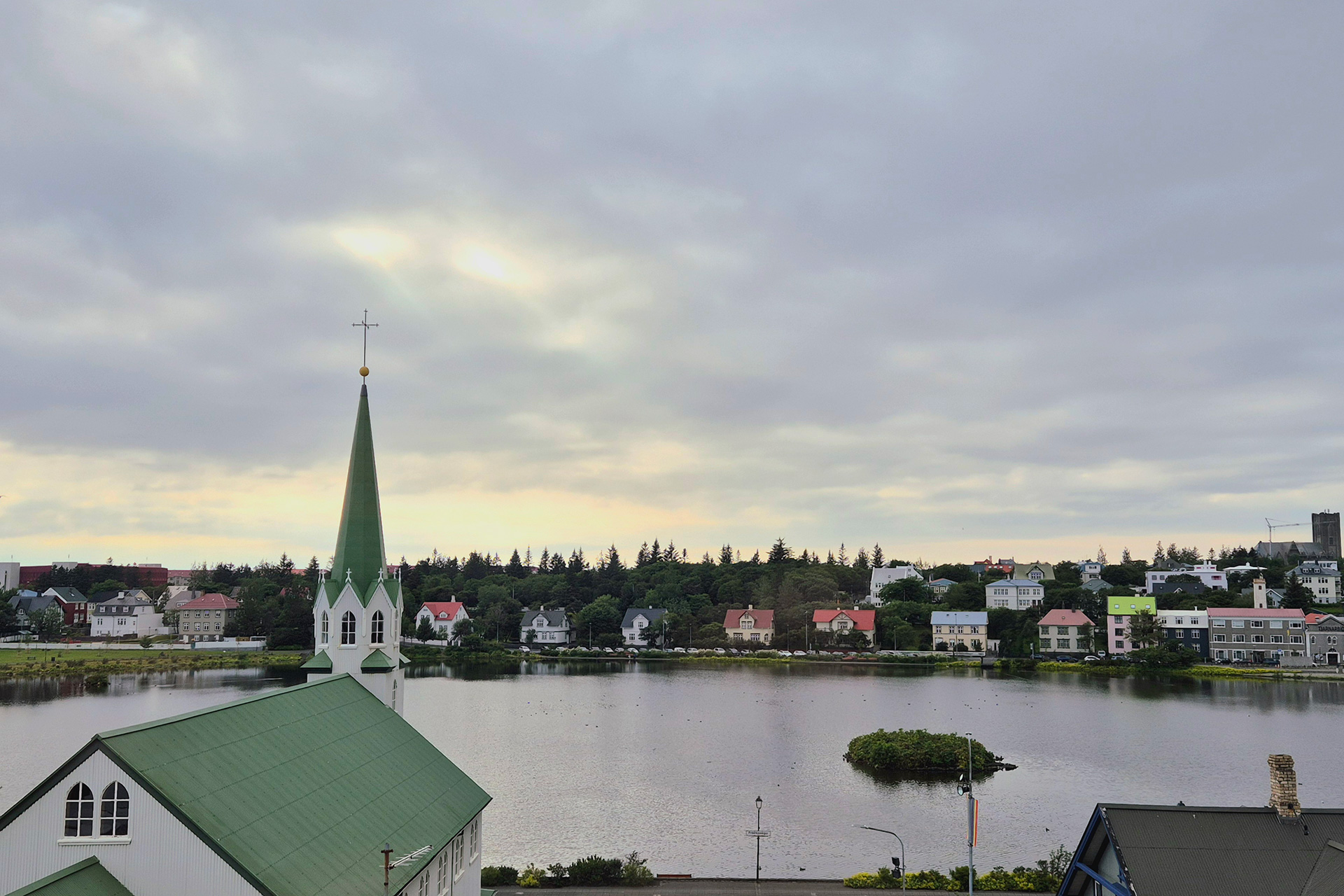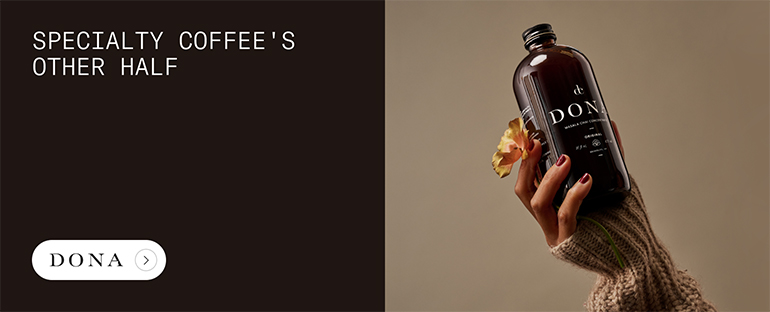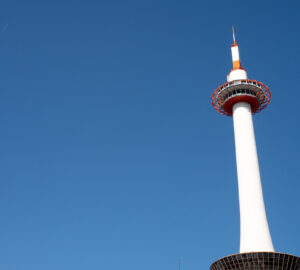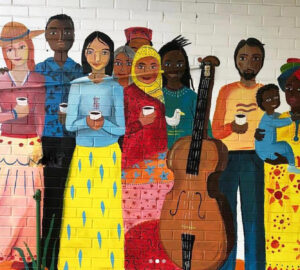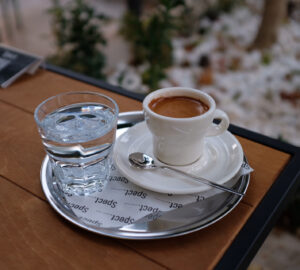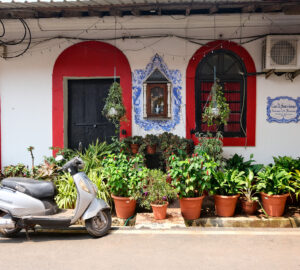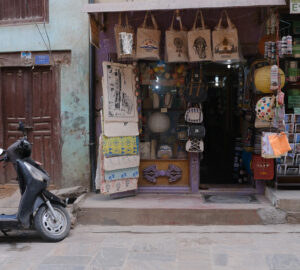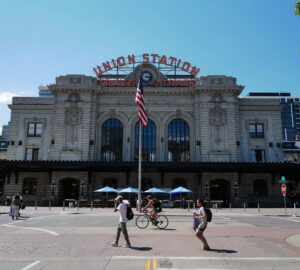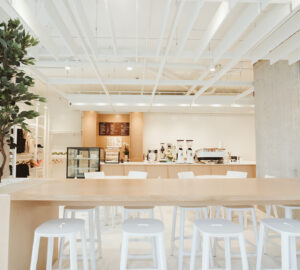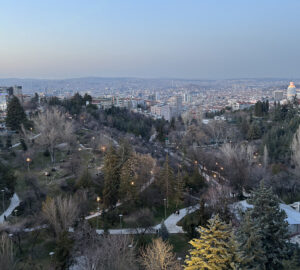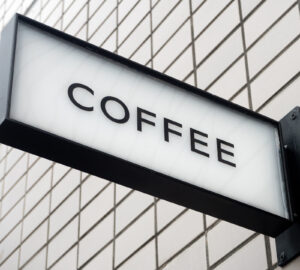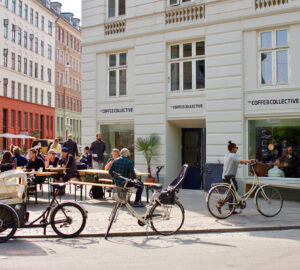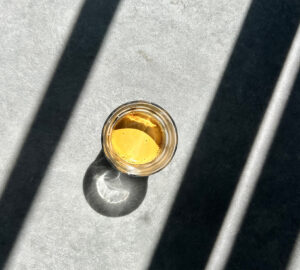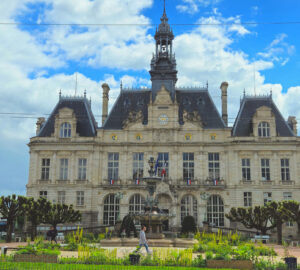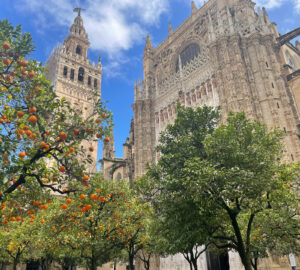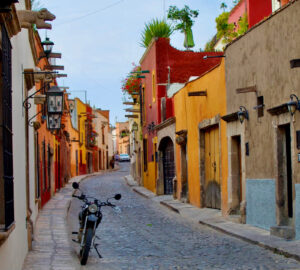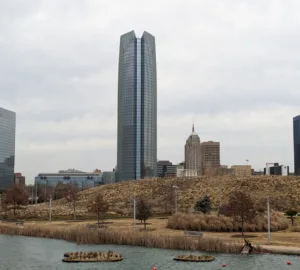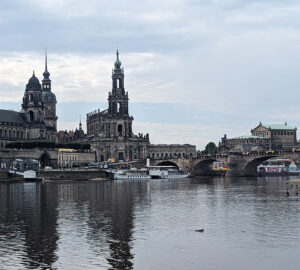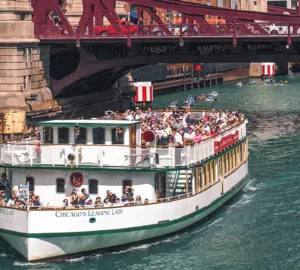Iceland was not always considered the travel destination it is today. It wasn’t until recent years that word got out about its shocking natural beauty, cultural richness, and lovely people. These days, folks from all over the world come to Iceland to experience volcanic mountain trails, vibrant wildlife, and glacial caverns where you’re allowed to swim. The population of the island nation is relatively small, only about 394,000, and about a third live in Reykjavík, the capital.
It’s also a fantastic place for coffee lovers since almost everywhere in Iceland has an espresso setup. That means dedicated grinders and baristas loading up portafilters and pulling shots at just about every restaurant, bar, and hotel you’ll find. “Drinking coffee is definitely a big part of our culture,” says Torfi Þór Torfason, co-owner of Reykjavík Roasters. “We don’t get a lot of daylight during the winter so we need coffee to help us wake up.” Even if you’re driving the Golden Circle, you’ll be able to grab an espresso somewhere on your journey.
If you ask locals what you should do while in their country, almost all of them will tell you to drive multiple hours outside of the capital and see the more remote parts of the island. Now, you could spend a lot of time discovering enchanted waterfalls, hiking up misty mountains, and soaking in geothermal hot springs and not have to drive far. Even so, if you do take the locals’ recommendations, you would see the best sights Iceland has to offer. The irony of this is that some of the best locations for coffee Iceland has to offer are within a mere mile of one another in the center of Reykjavík. It’s very possible (and recommended) to explore this part of the city on foot if you’re able.
Kaffi Ó-le
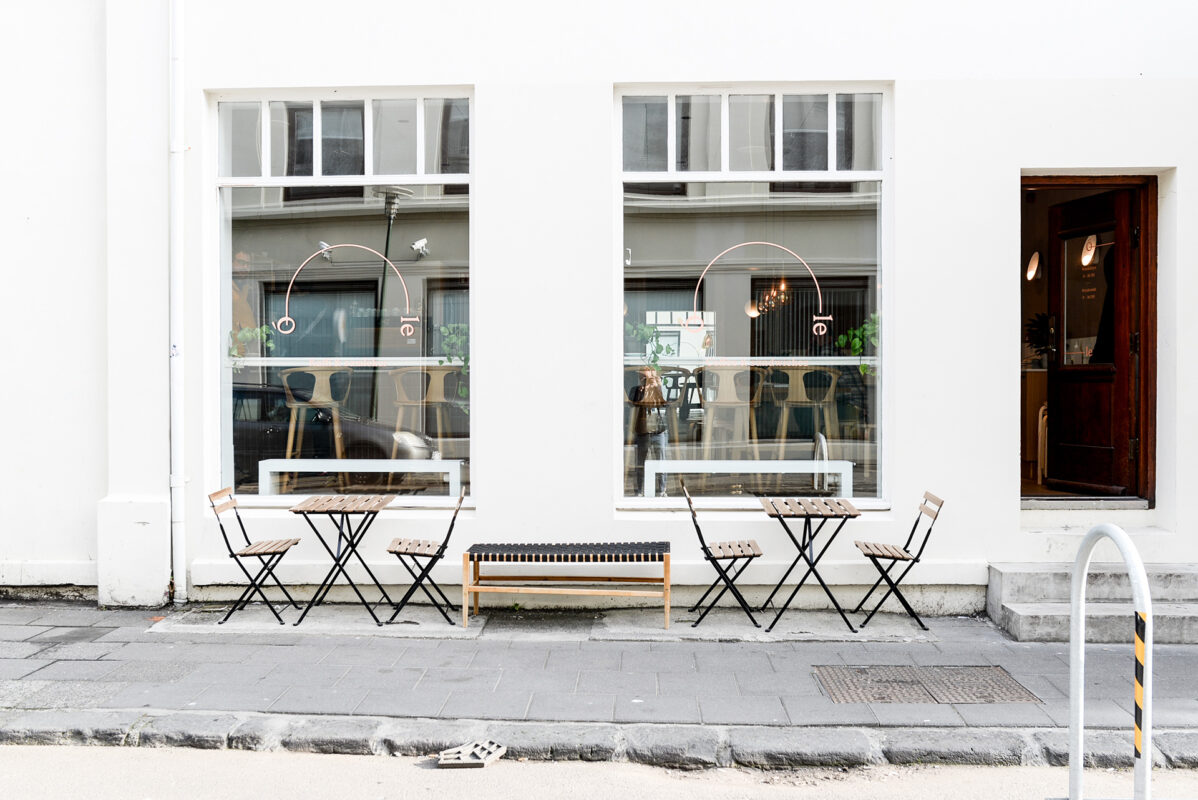
Right in the middle of the hotel center, down the street from the Parliament House, next to Brút, the best fish and wine bar in Rekjavík, you’ll find a bright and clean coffee shop called Kaffi Ó-le. The first thing you notice walking in is the simple and minimalistic design of the place which stands in contrast to the cozy, lived-in feel of most of the other cafes in town. There is a long, light-colored wooden community table and stools lining the window for patrons to post up and enjoy their brews. Further back, there is another little room with a couch and additional seating.
Espressos are served in a 6 oz Loveramics pastel ceramic mug. Swirl it around to incorporate the crema and take a little sip. Bright and chocolatey. Delicious and memorable. The finish is as clean as the aesthetic of the shop. The barista lets you know the coffee is Colombia Aponte Honey Processed, but it rotates. If you order a filter coffee to take with you, you’re handed a paper cup with another honey processed coffee, El Salvador Finca Atzumpa.
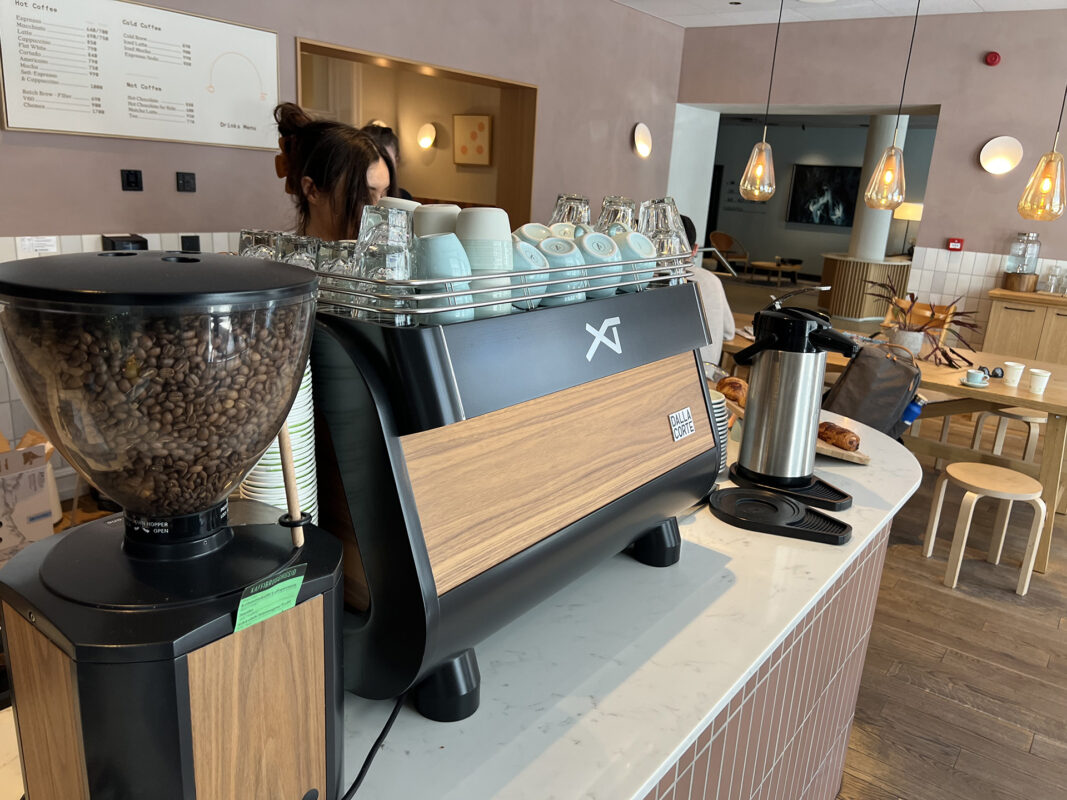
Kaffi Ó-le opened in the summer of 2021 and is owned by Ólafur Ólafsson, the same person who owns the fish and wine bar next door. Behind the bar they have a Dalla Corte espresso machine and grinder, a TONE Swiss brewer, and Chemex and Hario V60 for pour-over. For their beans, they knew right away they wanted to serve coffees roasted by Kaffibrugghúsið.
Kaffibrugghúsið
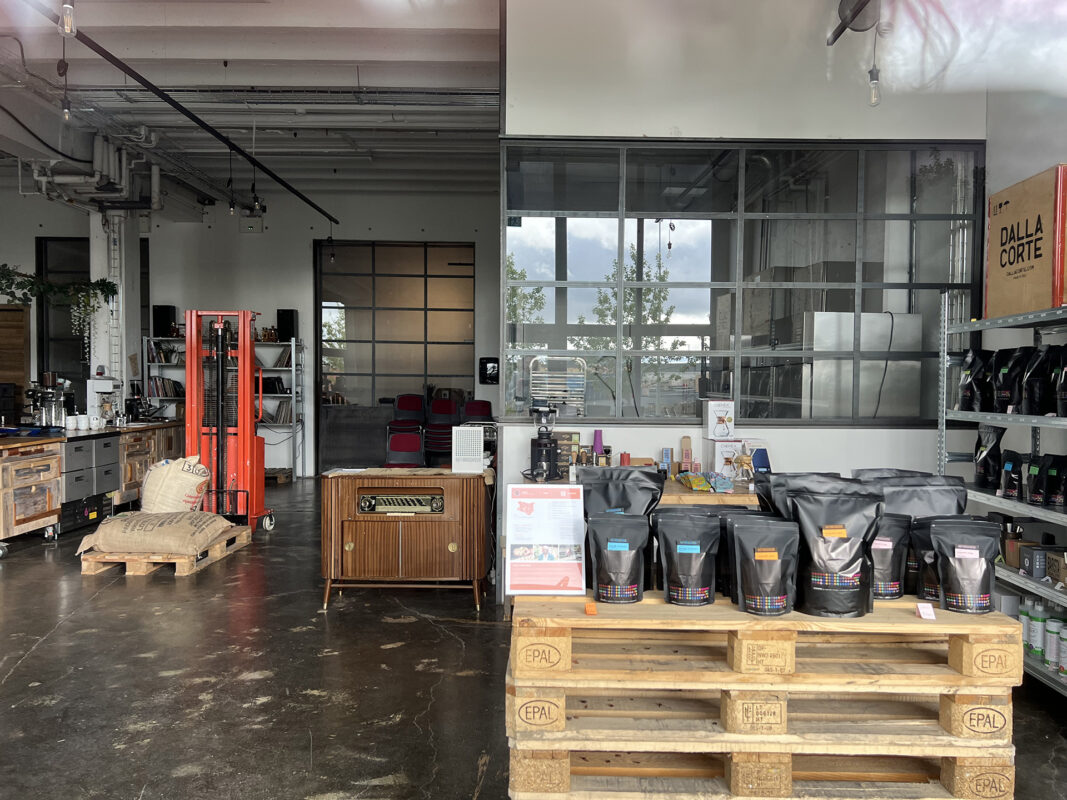
To find Kaffibrugghúsið, you have to walk down Fiskislóð toward the end of the Old Harbor. There, in an unassuming building, will be Sonja Björk Grant and Njáll Björgvinsson roasting coffee on their Giesen W6. Designed as a wholesale micro-roastery, Kaffibrugghúsið is not open to the public as a cafe. It is, however, open on Wednesdays and sells roasted coffee beans and brewing supplies. Moreover, they also use the roastery as an education space. Thursdays and Fridays are seminar days where they host four main types of classes—barista skills training, cupping, home espresso, and group coffee tastings. Anyone is welcome to participate in the seminars, and they also host barista training sessions for wholesale partners.
They started their current roasting operation in 2017 and added a webstore in 2020. Originally, they had ambitious plans to offer full breakfast and coffee service in addition to the roastery and education space. The pandemic forced them to simplify their plans, but they ponder opening a cafe in the space someday in the future.
Grant and Björgvinsson place a strong emphasis on being respectful to the farmers and the families that grow the coffee. They aim to bring out the character and flavor profile of the beans. “Kaffibrugghúsið has two roast styles, but of course many roast profiles depending on the origin, variety, or processing method,” says Grant. “We roast our coffees light to medium and lighter than the bigger roasting companies. We are very sensitive to when the coffee is over-roasted.”
Reykjavík Roasters
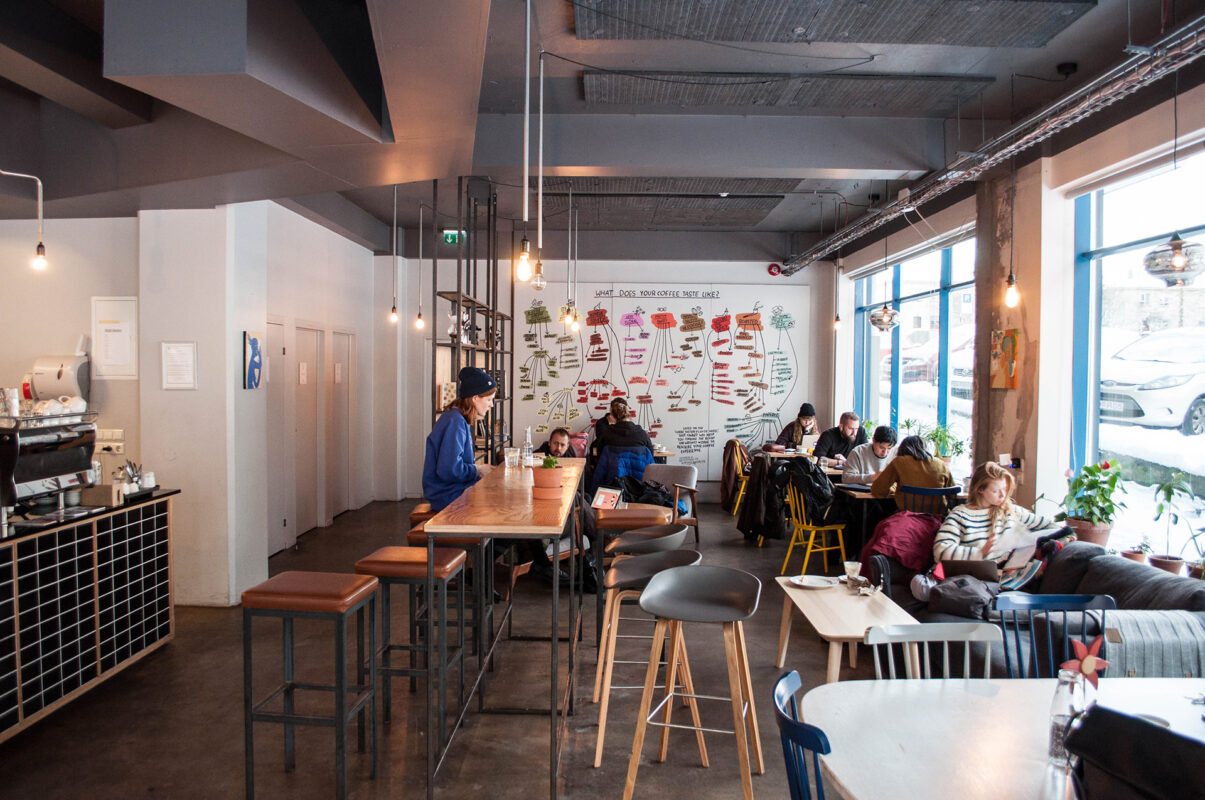
People know about Reykjavík Roasters. It’s evident from the line you might stand in and the numerous articles online that mention them. When it’s your turn to order, if you ask which coffees they offer as pour-overs, the barista responds by asking if you prefer a nutty profile or a fruiter one. Answer “fruity” and they will brew you a washed Colombia Buesaco in a Kalita Wave and serve it to you in a little silver kettle on a matching silver tray. It has a berry-like juiciness and a bright citrus acidity. Its color has a reddish hue when the sunlight touches it through the window. If you answer “nutty”, you’ll receive a different coffee that is equally as tasty.
The first location opened in 2008 inside an old house built in 1929 that used to be a skyr and milk shop. The cafe first operated under the name Kaffismiðja Íslands but changed to Reykjavík Roasters in 2013 after some renovations and rebranding. They now have three locations in Reykjavík—one on Brautarholt, another on Freyjugata, and the original on Kárastígur. Each one uses Victoria Arduino Mythos One grinders and various models of Synesso espresso machines.
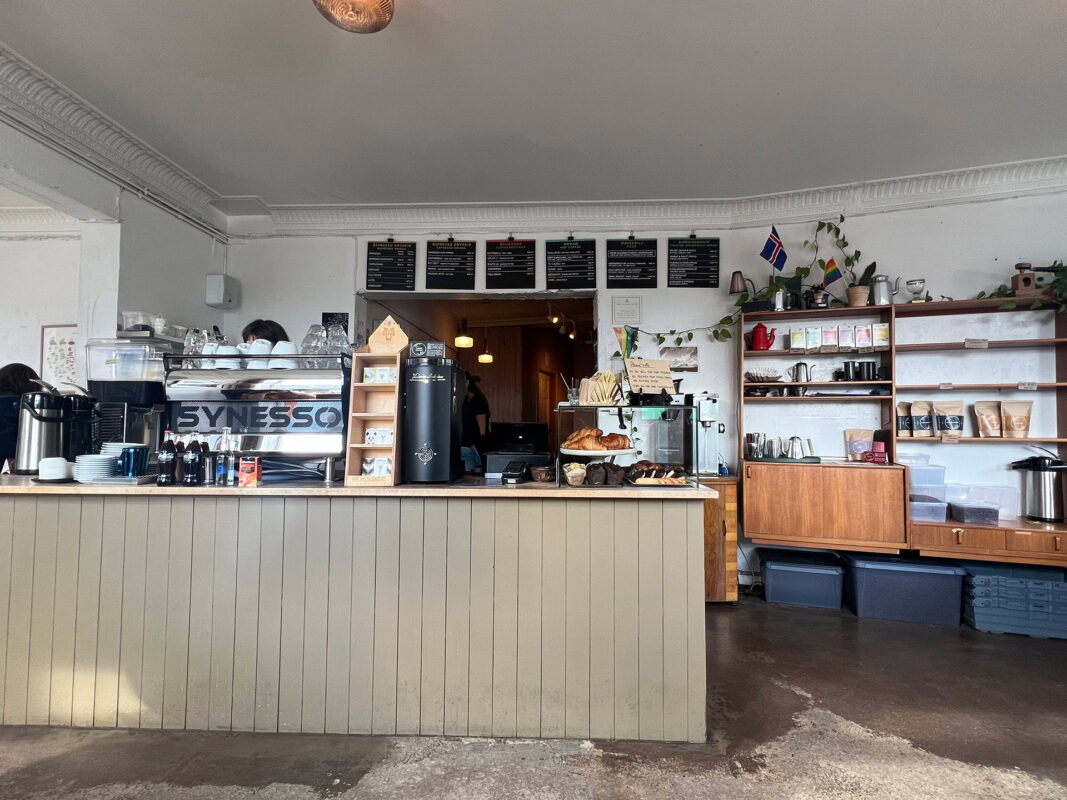
The roastery is in the same building as their Brautarholt location. There, they take a holistic approach to roasting where sweetness, bitterness, acidity, and body are all taken into consideration while highlighting what they think is most interesting in the coffees themselves. They roast to accentuate the nuances of the coffees they buy instead of buying coffees that fit inside a preconceived notion of what a coffee should be.
Te & Kaffi
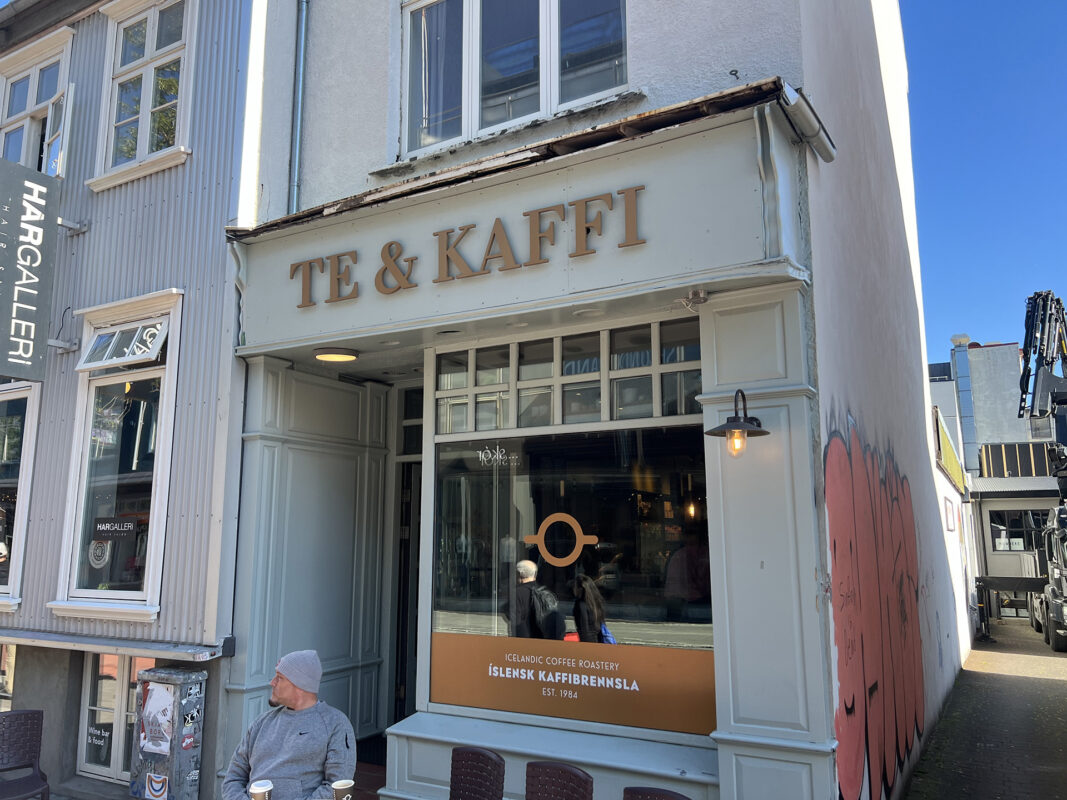
Don’t let it fool you that Te & Kaffi has eight locations and Oreo frappes on their menu. This is no corporate industrial roasting outfit where the coffees are roasted to oblivion. No, Te & Kaffi takes their roasting seriously. It’s evident in the subtle sweetness and citrus brightness found in their espresso as well as in the well-balanced chocolatey profile of the batch brew.
Started in 1984, Te & Kaffi’s founders, Berglind Guðbrandsdóttir and Sigmundur Dýrfjörður, were pioneers of specialty coffee and tea in Iceland. Their idea was clear and simple—introduce great loose-leaf tea and high-quality coffee to the people of Iceland. Today, they offer 23 types of tea and matcha, numerous coffees from origins around the world, and hold the largest market share in the nation’s retail coffee market. They also serve various food items such as authentic Italian sandwiches, croissants, traditional English scones, bagels, soup, cakes, and other sweet items.
Their approach to coffee roasting focuses on featuring a wide variety of roasting profiles. They make sure to offer a broad spectrum of flavors and styles to match anything their customers are looking for. Similarly, they place a focus on service and atmosphere in order to make their guests feel welcome and appreciated.
Kaffitár
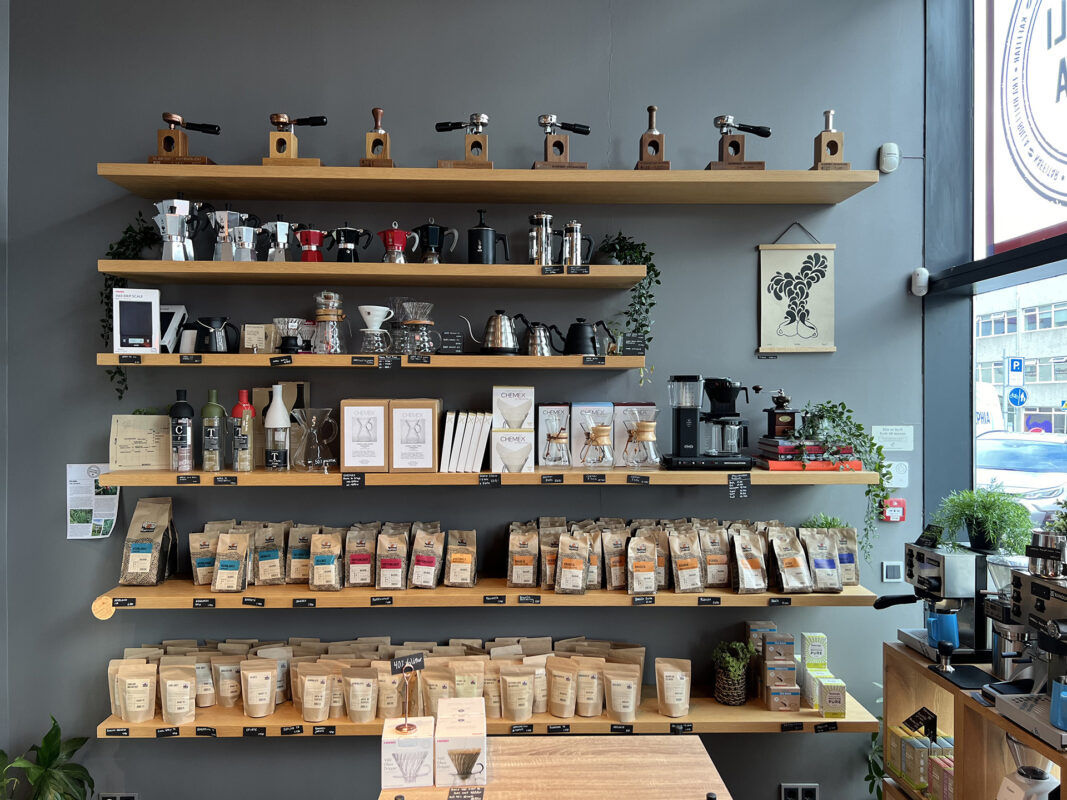
When you walk into one of Kaffitár’s three locations, you will notice shelves full of brewing devices, barista tools, bags of retail beans, and trophies from various competitions. Training and education have always been a focal point for them, and they take pride in the passion and professionalism that have characterized them since they began.
The company started after founder Aðalheiður Héðinsdóttir studied under the late world-renowned coffee taster, Victor Mondry, in the United States. Upon returning to Iceland in 1990, Héðinsdóttir started Kaffitár and ran it for 28 years. In 2018, she sold the brand to Nýja Kaffibrennslan but remains on as the company’s green coffee buyer today. You can spot their roasting plant on the ocean-side of the highway that runs from Keflavík Airport to Reykjavík.
Kaffitár states that their values are dedication and multiculturalism which are reflected in their sponsorship program where they support organizations that help people with developmental disabilities, illnesses, and others who are in need. They also support many art and cultural events and offer grants to community groups in the area.
Kaktus Espressobar
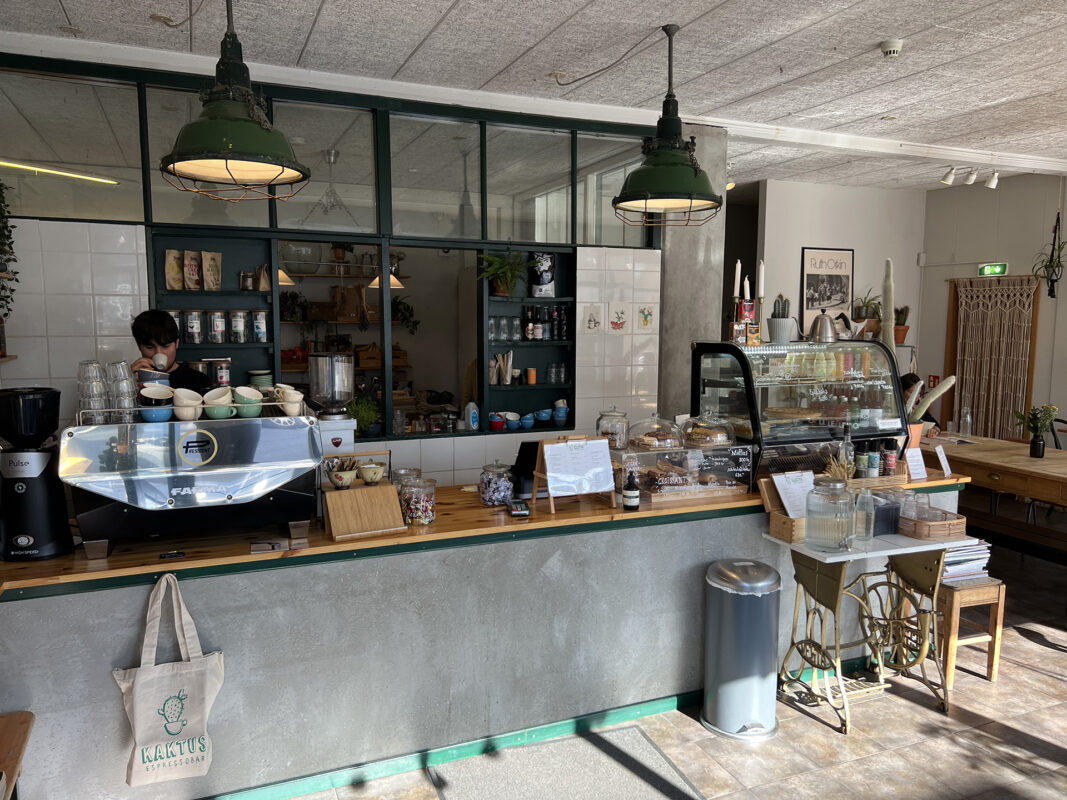
When you walk into Kaktus Espressobar, you are greeted by a friendly barista standing behind a Faema President espresso machine that sits on the counter flanked by two different grinders on either side—a Faema MD 3000, which is used as their main espresso grinder, and a Eureka they use for decaf. As you sip on your espresso, you’ll notice a classic Italian profile of nutty dark chocolate and earthy roastiness. It has the kind of boldness that holds up well in milk and complements its sweetness. Their coffee comes from Caffè Italia, a roasting company north of Rome involved with other culinary pursuits in the region like olive oil and wine.
The founders of Kaktus Espressobar got connected with the folks at Caffè Italia when one of them owned another cafe in Italy years ago. When the founders started dreaming of opening a cafe dedicated to their love of dark roasts, Caffè Italia was the natural choice for a roasting partner, and they have been using their beans ever since. The house blend, Michelangelo, is comprised of Arabica beans from Brazil and India mixed with robusta to help keep classic Italian flavors consistent.
After almost six years of business, Kaktus Espressobar is opening a second location at the Icelandic National Gallery by the Reykjavík Pond. Their loyal following is made up of both tourists and locals, but they say it’s the people in the neighborhood that have really kept them going, especially through the pandemic times when tourism had almost completely dried-up. They claim that their regulars are typically locals who don’t prefer flowery or bright coffees—people who want that classic flavor and want quality.
Scott Bufis is a writer and coffee professional based in Chicago. This is Scott Bufis’s first feature for Sprudge.











